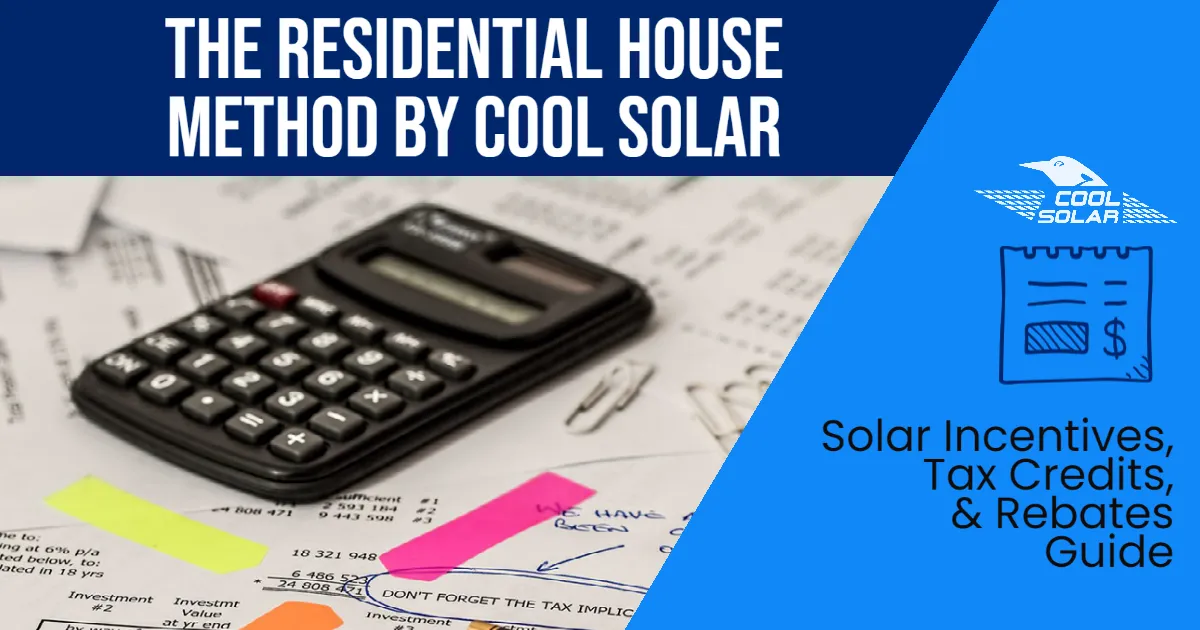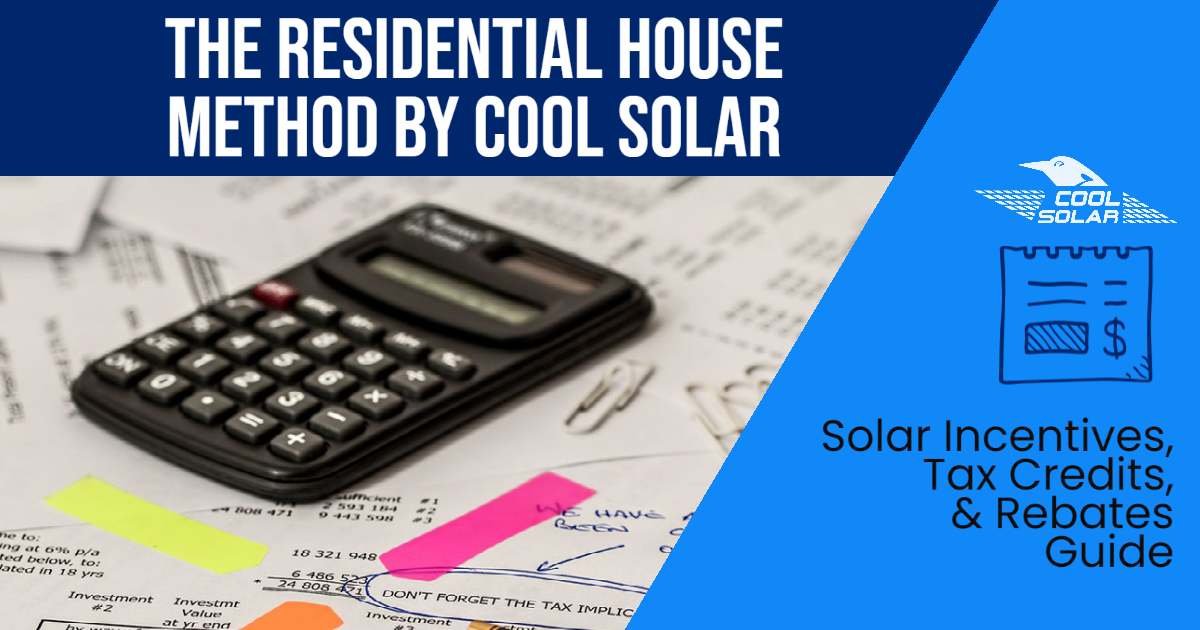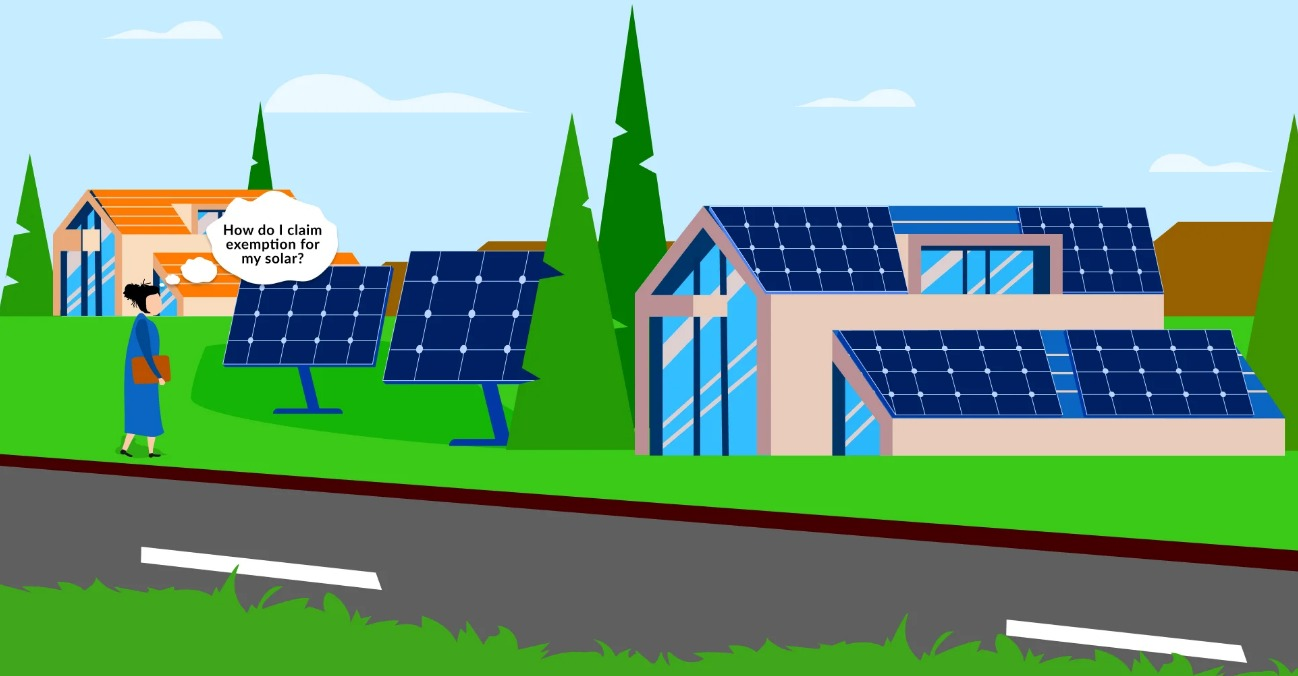LEARN ABOUT SOLAR POWER
WITH COOL SOLAR
LEARN ABOUT SOLAR POWER
WITH COOL SOLAR
Get the latest news and tips about solar power from Cool Solar. We make it easy for you to understand everything about this renewable energy source.
Get the latest news and tips about solar power from Cool Solar. We make it easy for you to understand everything about this renewable energy source.
// SOLAR COMPANY IN TEXAS
THE COOL SOLAR BLOG

Texas Solar Incentives: Tax Credits & Rebates Guide (2023) - Residential House Method 🌞
Texas Solar Incentives: Tax Credits & Rebates Guide (2023) - Residential House Method 🌞

Texas residents who are looking to go solar in 2023 are in luck as there are a number of solar incentives available to them. These incentives come in the form of tax credits and rebates that help offset the cost of a solar panel installation, making it more affordable and accessible.
The Residential House Method by Cool Solar is a comprehensive guide to understanding the Texas Solar Incentives program and how to claim the benefits. The guide breaks down the incentives into a simple, three-step process, helping homeowners determine if they are eligible and what forms they need to fill out in order to claim the credits.
Additionally, the guide provides detailed instructions for filling out Form 5695 and adding values to Schedule 3 and Form 1040.
Finally, the guide highlights how much the solar tax credit can save homeowners, providing a clear picture of the financial benefits of going solar in Texas. With the help of this guide, Texas residents can make an informed decision about going solar, knowing that they can take advantage of the state's generous incentives and reap the rewards of clean, renewable energy for years to come.

What's In This Article
FAQ's
What Do Texans Need to Know About the Federal Solar Tax Credit?
What Do Texas Solar costs look like?
How to Claim the Federal ITC in Texas
How to Claim the Property Tax Exemption in Texas
Do solar panels increase property taxes in Texas?
How much can you write off for solar panels on taxes in Texas?
How much will my electricity bill go down with solar in Texas?
Which Tax Incentives Are The Best In Texas?
What Do Texans Need to Know About the Federal Solar Tax Credit?
The Federal Solar Tax Credit, also known as the Investment Tax Credit (ITC), is an incentive offered by the federal government to encourage the use of solar energy. It allows individuals and businesses who install solar panels to receive a tax credit equal to 30% of the total cost of their solar system.
This credit is available to all Texans who install a solar panel system on their home or business. It is important to note that the credit amount decreases every year, so it's best to take advantage of it as soon as possible.
To claim the credit, individuals must complete and submit Form 5695 to the Internal Revenue Service (IRS). The form must be filled out correctly and include all necessary information, such as the cost of the solar panels, installation, and any other related expenses.
The credit can be claimed in the year the solar panel system is installed and put into service. The Federal Solar Tax Credit is a great opportunity for Texans to save money on their investment in solar energy, so it's important to take advantage of it and reap the benefits of clean, renewable energy for years to come.

What Do Texas Solar costs look like? 👷♀️
The cost of installing solar panels on your home in 2023 can vary depending on a number of factors such as the size of your home, the location, the type of panels you choose, and the company you choose to install them. On average, the cost of a solar energy system for a home in the U.S. can range from $10,000 to $30,000.
However, it's important to keep in mind that this initial investment can be offset by the savings on your electricity bills per watt over time, as well as any incentives or rebates that may be available in your area.
If you'd like to know more about the costs of solar panels in your area, read our blog on the Costs of Solar Panels here.
Additionally, solar panel costs have been decreasing over time and are expected to continue to do so in the future, making them more accessible and affordable for homeowners. It is advisable to get a quote from a solar company to give you a more accurate cost of installation for your home.
Texas Solar Rebates and Tax Credits Calculator
In addition to reducing your electricity bills over time, solar system costs in Texas may also qualify you for tax credits or other incentives from local or state governments. These incentives can help offset some or all of the upfront costs associated with a solar installation so it’s important to research what incentives are available before making any decisions about which type of system is right for you.

Did you know the tax credit was extended?
Homeowners installing a solar power system in 2020 and 2021 are eligible for a 26% tax credit, which was extended to 30% in August 2022. This nonrefundable credit can be used to deduct up to 30% of the cost of the solar energy equipment installed in a residence from now until 2032.
How to Claim the Federal ITC in Texas 💵
Claiming the federal Investment Tax Credit (ITC) for solar panels in Texas is a straightforward process that can save homeowners and business owners thousands of dollars.
To claim the ITC, you first need to make sure that you are eligible, which typically requires that the solar panel system was installed on your property and put into service in the tax year for which you are claiming the credit.

Next, you will need to gather the necessary forms, including Form 5695 and Schedule 3, which are used to calculate the credit. Once you have the forms, you will need to fill them out accurately and completely, following the instructions provided by the Internal Revenue Service (IRS).
Finally, you will need to submit the forms along with proof of the solar panel system installation, such as a certificate of completion, to the IRS. With the right documentation and preparation, claiming the federal ITC in Texas can be a simple and rewarding process that can save you significant money on your taxes while also helping you reduce your carbon footprint.

Calculate Incentives for Your Home's Location
Solar energy is taxable at the federal, state, and local levels. Below is a list of available incentive offers for homes that you may qualify for.
At the federal level, there is the Investment Tax Credit (ITC), also known as the federal solar tax credit, which allows homeowners to claim a tax credit of 26% of the cost of their solar energy system on their federal income tax return. Due to the Inflation Reduction Act, the federal ITC has jumped up to 30% for all systems installed in 2022.
State solar incentives vary significantly from state to state, with some offering upfront rebates for installing a solar power system[1].
In regards to Texas solar incentives, Texas does not have any specific state tax credits or rebates for solar energy systems, but homeowners may still be eligible for other incentives such as the federal ITC or property tax exemptions.
"Once you got a solar panel on a roof, energy is free" - Elon Musk
However, Austin, Texas homeowners have access to several lucrative solar incentives and rebates[2][3][4]. For instance, Austin Energy provides a $2,500 rebate for taking their solar education course and installing an eligible photovoltaic (PV) system on your home[1], plus the Federal Solar Tax Credit that offers up to 30% reduction in cost of the same PV system.[4]
Even more so, Austin Energy customers can receive an additional rebate of $500 if they install solar power systems in the local area[2], while other utility companies offer rebates reaching up to a whopping $8,500 for each kilowatt of solar installed! [4]. Furthermore, homeowners are eligible to exploit Texas' Solar Rights Law and reap the rewards from an Inflation Reduction Act (IRA) tax credit which grants them with 30% off on their system's cost. [4]
To finish off, TXU Energy's Home Solar Buyback Plan empowers homeowners to monetize their Texas solar installation by receiving payments for surplus energy generated.
1 austinenergy | 2 energysage | 3 goadtsolar | 4 sunrun
EcoWatch's Opinion on the Federal ITC in Texas
EcoWatch wholeheartedly endorses the federal Investment Tax Credit (ITC) in Texas as a fundamental instrument to foster solar energy growth across America. With this policy, residents installing solar systems on their homes can take advantage of a 30% tax credit - an offer that has been demonstrated time and again to be very encouraging for transitioning towards cleaner sources of power.
Homeowners who recently installed solar panel systems in 2022 can take advantage of the Federal Investment Tax Credit (ITC). On top of this, select states and Puerto Rico offer additional incentives to prompt homeowners to install solar power. These state tax credits work just like the ITC, but with varying amounts depending on which region you are in.
Summary of Texas Solar Incentives 2023
Texas offers a variety of solar incentives for homeowners and businesses in 2023, including rebates, tax credits, and property tax exemptions. [1][2][3]
Homeowners in Oncor service territory and Austin are eligible for a rebate of up to 30% of the total cost of their solar power system. [2][4]
The federal solar investment tax credit is available to all states at 30% for home solar systems that are purchased and installed by December 31, 2022, and decreases to 22% in 2023. [1]
Texas also offers access to financing for energy-efficient power systems and upgrades through the PACE financing program. [2]
Additionally, Texas residents are exempt from property taxes on the added value to their home that comes with installing a solar energy system. [2][3]
These incentives can help reduce the cost of going solar in Texas significantly.

What You Need to Know About the Renewable Energy Systems Property Tax Exemption in Texas
In Texas, property owners who install a renewable energy system on their property may be eligible for a property tax exemption.
This means that the value of the renewable energy system will not be included in the taxable value of the property.
This exemption applies to residential, commercial, and industrial properties, and it can result in significant savings for property owners who install a solar energy system.
To be eligible for the exemption, the renewable energy system must meet certain requirements, such as being designed primarily to provide heating, cooling, hot water, or electricity to the property, and it must meet certain efficiency standards.
To claim the exemption, property owners must file an application with their local appraisal district. It's important to note that the rules and regulations surrounding the renewable energy systems property tax exemption in Texas can be complex, so property owners should consult with a tax professional or a solar energy provider to ensure they are taking advantage of all available benefits.
"A strong renewable energy industry is good for our environment and our economy" - Roy Cooper
Learn more about Solar Panels
With the cost of electricity steadily increasing in Texas, residents are feeling the pinch. The Electricity Reliability Council of Texas (ERCOT) set a new record for summer electricity prices, resulting in higher electric bills for residential customers during peak times.
During this period, electricity costs were as much as triple what they normally were – an unsustainable situation for any budget. With costs continuing to rise and no end in sight, solar energy is becoming an increasingly attractive energy option for Austinites looking to reduce their monthly energy bills from their utility provider.
Solar technology provides a renewable source of power that can help reduce or even eliminate the high costs associated with relying on the grid, while still providing reliable access to clean energy.

How to Claim the Property Tax Exemption in Texas
Texans enjoy a wide range of exemptions when calculating their property taxes, either partial or total (otherwise known as absolute). All exemptions are based on the appraised value of the property.[1].
Homeowners may be eligible for a variety of exemptions, such as the General Residence Homestead Exemption, Age 65 or Older or Disabled Exemption, Manufactured and Cooperative Housing Exemption, Veterans Exemptions, Agricultural Exemptions, Senior Citizen Exemptions and Optional Percentage Homestead Tax Reduction.[2][3][4].
Owning a home is expensive enough, so why not save some money on property taxes? The General Residence Homestead Exemption can help by removing a portion of the value from taxation, resulting in significant savings for homeowners.[3].
Homeowners must meet several criteria in order to take advantage of this exemption: they must be the legal owner (even partial ownership counts!), it is their main residence, and any other homesteads located either inside or outside Texas are not eligible for an exemption.[2].
For those over the age of 65 or who are disabled, the Age 65 or Older or Disabled Exemption is a helpful tool that provides an additional $10,000 exemption from school taxes.[4].
If you're a homeowner in Texas and want to take advantage of the homestead exemption, be sure to contact your local appraisal district office. Don't wait too long though - applications must be sent by April 30th for them to go through in time for October's property tax bill![3].
In Short...
Property owners in Texas are eligible for a property tax exemption on the value of their solar energy system. [1][2]
To claim the exemption, property owners must submit an application to their local appraisal district. [2][3]
The application must include a copy of the solar energy system contract, proof of ownership, and proof of occupancy. [4]
Leased systems do not qualify for an exemption, but they are considered personal property and should not be taxed as part of the real property. [4]
The general deadline for filing an exemption application is before May 1. [2]
"We don't know the millionth part of what is discovered in electricity" - Thomas Edison

What is EcoWatch's Opinion on Property Tax Exemption in Texas?
EcoWatch highly recommends the property tax exemption in Texas, considering this state does not have a traditional income tax and instead is reliant on an above-average rate of taxation for homes [1].
According to the Solar Energy Industries Association, 36 states offer such exemptions that reduce part of their home value from being taxed at all [2]. (Talk about some tax incentives!)
These Texas Solar Panel Incentives have proven successful time and time again as it leads to lower taxes overall [3][4][5], making it one of the best options available for homeowners wanting sustainable energy sources.

How Does Net Energy Metering in Texas work?
Net Energy Metering (NEM) in Texas allows homeowners who have installed a solar panel system to send any excess energy generated back to the grid for credits on their utility bill. This means that when a homeowner generates more energy than they use, the excess energy is sent back to the grid and the homeowner receives credits for that energy.
When the homeowner uses more energy than they generate, they simply draw from the energy stored on the grid and pay for it as they normally would. The credits from the excess energy can be used to offset the cost of the energy used from the grid, reducing the homeowner's monthly energy bill.
The net meter installed by the utility company tracks the flow of energy to and from the grid and calculates the homeowner's credits.
This allows homeowners to take advantage of the benefits of solar power while still having access to the grid as a backup.
NEM is an effective way for Texas homeowners to save money on their energy bills and support the growth of renewable energy in the state.
Learn the Details of Texas Solar Incentives with a Free Consultation
FUN FACT: How many homes in Texas have solar panels? ⚡️
According to the Solar Energy Industries Association, there are currently 780,000 households in Texas with home solar systems, [1] making it the second-highest state in the US after California. This number is expected to increase significantly in 2021 due to the recent winter storm and skyrocketing electricity prices. [3]
Additionally, EnergySage reports that there is a consistent interest in new solar systems across the US. [3]
With 4 GW of new solar energy capacity set to be installed in the next five years, [2] it is likely that this number will continue to grow.
What You Need to Know About Texas Solar Rights
Homeowners in Texas are legally protected from having their right to install solar panels on their property denied by state laws. Property Owners Associations and Homeowners Associations, for example, cannot restrict or prohibit the installation of solar energy devices[2]. Additionally, House Bill 362 prohibits residential developments with more than fifty homes from banning or restricting homeowners from installing solar panels [1][2]., thus granting even further access to renewable energy sources within the state.
Homeowners Associations may still impose certain regulations on the installation and placement of solar panels[1], or even restrict them to specific parts of a homeowner’s roof[2]. Furthermore, Texas Senate Bill 1626 allows developers to forbid homeowners from installing solar systems in residential areas altogether[2]. Fortunately for Texans, Solar United Neighbors offers resources that provide an understanding on their rights regarding rooftop PV Systems installations[3]!
Texas Senate Bill 398 ensures that consumers can acquire energy independence and reap the benefits of rooftop PV systems by prohibiting unreasonable restrictions from municipalities and HOAs.[4][5] This is an incredible opportunity for residential installers or contractors who want to join the solar market in Texas, so homeowners should take advantage of their rights under this bill prior to beginning any installation project.
How to Claim the Texas Solar Rights
Homeowners in Texas can install solar energy systems on their property without getting prior approval from a homeowners association or property owners association. Nevertheless, it is possible the HOA may impose restrictions as to how and where such systems are installed. Fortunately, House Bill 362 effectively protects them against any outright restriction by these two entities based on Texas Property Code Section 202.010 and Tax Code Section 171.107[1].
Homeowner's Associations (HOAs) hold the power to decide where solar panels can be situated on a home, but if homeowners are able to demonstrate that another place is more effective[1], they're provided with an opportunity to request for it. Texas Senate Bill 1626 closed historical loopholes, allowing developers and HOAs in residential subdivisions to bar homeowners from installing solar panels.
Despite HOA contracts, homeowners are protected by state-level laws that give them the right to install solar on their property without restriction. Unfortunately, certain aesthetic and placement restrictions may make it difficult or expensive for these same homeowners to go solar. Therefore, written approval from your HOA is usually required prior to any installation of a solar project - with the understanding as well that they will designate where exactly you put up your system.
BONUS: Let's Talk Insurance...
Will My Insurance Go Up By Adding Solar Panels?
Adding solar panels to your property in Texas may result in an increase in your homeowners insurance premium[1][2][3].
This is because the replacement cost of the solar panels will likely need to be accounted for, which will raise your coverage limits and thus increase your premium[1].
Additionally, solar panels add value to a home, so the total value of the home will also increase and result in a higher premium.
It is important to speak with your insurance company before installing solar panels or buying a home that already has them installed, as they can help you understand how they are covered by your policy[3].
You may also need to purchase additional coverage or an entirely separate policy if your insurer does not provide adequate coverage for the solar panels[1].
Additionally, you should make sure that the coverage limit of your policy is enough to repair both your home and the solar panels[3].
Overview 😎
In conclusion, Texas is a great state for homeowners and businesses looking to switch to renewable energy. With a variety of solar incentives available, such as the Federal Investment Tax Credit and various rebates offered by local utilities, there has never been a better time to go solar.
By installing a solar panel system, not only will you be reducing your carbon footprint, but you'll also be able to save money on your energy bills.
At Cool Solar, we understand the process of applying for solar incentives and we are here to help guide you through every step of the way. From choosing the right solar panel system for your needs, to completing the necessary forms and paperwork, our team of experts is here to support you.
So, why wait? Take advantage of the many benefits of solar energy today and start saving on your energy bills tomorrow.
Who is Cool Solar?
We are a solar company based in Austin, Texas that serves throughout the great State of Texas.
We'd love to serve you for your residential solar panel systems and ensure the best solar panel prices! With ZERO upfront costs and 30% federal tax incentives for your energy usage, your solar systems could completely wipe your utility bill.
"How much electricity will I need for my solar costs invested to pay my utility bill?"
Schedule a time with our Energy Consultants to define the cost per watt and potential solar savings through our solar calculator.
(830) 832-4867
Click Here for your Free Home Efficiency Solar Report for your home!
FAQS: RESIDENTIAL SOLAR PANEL INSTALLATIONS
How Long Do Solar Panels Typically Last?
Solar panels have a lifespan of 25-30 years on average. Proper maintenance, such as cleaning and inspections, can help prolong their lifespan. However, it's important to note that over time, the efficiency of the panels will decrease, typically at a rate of 0.8% per year, which can impact the amount of energy produced.
Is A Solar Powered Home Possible?
Yes, using solar power to run a household is entirely possible in this day and age. With the ever-evolving technologies surrounding solar panel systems, the amount of energy that can be produced by the sun is now more than enough for a home's daily power needs. This includes powering lights, air conditioning, appliances, and other essential items.
When installing solar panels on a roof or in an area with ample sunlight, homeowners can take advantage of Texas' plentiful sunshine year-round. Solar cells convert the sun's energy into electricity that can be used in your home. For optimal performance and maximum efficiency, it's important to have high-quality solar panels and batteries in order to effectively store the energy collected by these cells. A premium battery system will then allow you to store any excess energy during sunny days so you have power even during those long Texas nights.
What Should I Consider Before Installing Solar Panels?
Before making the decision to install solar panels, it is vital for you to research a few key factors and ask questions to ensure your roof is the right shape, type, orientation, direction and slope and strong enough to support your investment. You should also check up on local rebates and incentives available in your area, as well as warranties offered by the company you are considering hiring.
Additionally, be sure to look into any regulations set forth in your homeowners association (HOA) that may impact whether or not solar energy can be utilized on your property. It is also important for you to assess the current energy efficiency level of your home. Knowing how much energy you typically use on a regular basis will help determine how much solar power you need to provide the necessary amount of electricity for your family’s daily needs. You will want to factor in the cost of solar power in your area and any additional costs associated with installation when deciding which option is best suited for you financially.
In most cases, a professional installer should be consulted prior to installing new solar panels in order to make sure everything has been properly evaluated before proceeding with installation. Understanding all of these components can help ensure that you make an informed decision on whether or not solar energy is right for you.
How Many Solar Panels Do I Need?
By looking up your home's hourly energy requirement in kWh over a 30-day period, you can determine how much electricity you will need each month and therefore how many solar panels are required. This data is often available on your monthly energy statements or by simply asking your utility provider to calculate it for you.
In addition to the number of watts needed per panel (either 150W or 360W), you will also need to consider the number of peak sunlight hours in your area for the time of year when installing the system. This can vary drastically based on where you live, so an online search should provide this information quickly and easily. Once all these factors have been taken into account, then you can determine the total amount of electricity generated from a specific number of panels that best fits your needs.
It is important to note that although more wattage typically means more energy production, higher wattage doesn’t always mean savings if it’s not necessary for the size of system being installed. Furthermore, solar systems with high wattage may require larger wiring and other equipment which could increase installation costs significantly. Therefore, it is essential that homeowners do their research and understand exactly how much power they need before making any decisions regarding their system's specifications.
Additionally, it’s beneficial to seek professional advice from a qualified solar installer who can help design a customized solution tailored to meet your individual needs while still providing optimal cost savings for years to come!
Want To Automatically See How Many Panels You Need?
Begin with our Savings Calculator and we can do the work for you!
LOOKING FOR MORE?
RESERVE YOUR FREE CONSULTATION.
To get started on solar panel installation, send us your information.
We'll review your information and contact you to schedule an appointment.
An energy consultant can meet with you either in person or virtually to provide a custom proposal tailored to the size and design of your system, as well as financing and long-term savings options.
LOOKING FOR MORE?
RESERVE YOUR FREE CONSULTATION.
To get started on solar panel installation, send us your information.
We'll review your information and contact you to schedule an appointment.
An energy consultant can meet with you either in person or virtually to provide a custom proposal tailored to the size and design of your system, as well as financing and long-term savings options.


